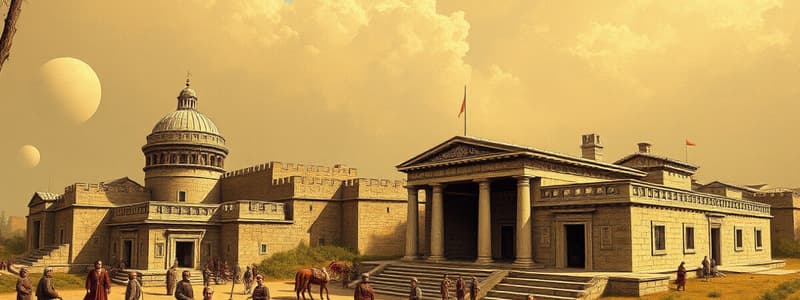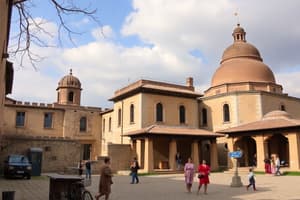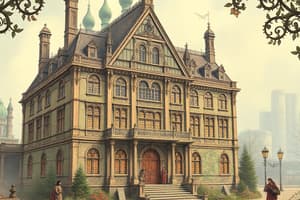Podcast
Questions and Answers
What is one of the primary functions of studying history?
What is one of the primary functions of studying history?
- To create fictional narratives
- To simplify complex events
- To promote nationalistic sentiments
- To understand current societies and cultures (correct)
Which period is characterized by the fall of the Roman Empire and the rise of feudalism?
Which period is characterized by the fall of the Roman Empire and the rise of feudalism?
- Modern Era
- Medieval Period (correct)
- Renaissance
- Ancient Civilizations
What major global conflict occurred during the Modern Era?
What major global conflict occurred during the Modern Era?
- The War of the Roses
- The Crusades
- The French Revolution
- World Wars (correct)
Which historical figure is known for leading the Indian independence movement through non-violent resistance?
Which historical figure is known for leading the Indian independence movement through non-violent resistance?
What is a significant aspect of 'revisionist history'?
What is a significant aspect of 'revisionist history'?
Which theme in history primarily focuses on the aspects of trade and economic systems?
Which theme in history primarily focuses on the aspects of trade and economic systems?
What is a primary source in historical research?
What is a primary source in historical research?
What type of history considers multiple perspectives including race, gender, and class?
What type of history considers multiple perspectives including race, gender, and class?
Flashcards are hidden until you start studying
Study Notes
Overview of History
- Definition: The study of past events, particularly in human affairs.
- Branches:
- Ancient History
- Medieval History
- Modern History
Importance of History
- Understanding Past Events: Helps explain current societies and cultures.
- Learning from Mistakes: Provides insights into human behavior and decision-making.
- Shaping Identity: Contributes to national, cultural, and personal identities.
Key Historical Periods
-
Prehistoric Era
- Time before written records.
- Development of early human societies (hunter-gatherers).
-
Ancient Civilizations
- Sumerians, Egyptians, Indus Valley, Chinese Dynasties, Mesoamerican cultures.
- Inventions in writing, agriculture, and technology.
-
Classical Antiquity
- Rise of empires: Greece, Rome, Persia.
- Advancements in philosophy, politics, and the arts.
-
Medieval Period (500-1500 CE)
- Fall of the Roman Empire.
- Feudalism, the rise of kingdoms, and the spread of religions.
-
Renaissance (14th-17th century)
- Cultural revival in art, literature, and science.
- Humanism and exploration.
-
Modern Era (18th century - Present)
- Industrial Revolution: Technological advancements and urbanization.
- World Wars: Major global conflicts and their impacts.
- Cold War: Tension between superpowers, leading to political and military strategies.
Historical Methodology
- Sources:
- Primary: Original documents, artifacts.
- Secondary: Analyses, interpretations by historians.
- Techniques: Archaeology, textual analysis, oral history.
Significant Historical Figures
- Alexander the Great: Conqueror and spreader of Hellenistic culture.
- Julius Caesar: Key figure in the transition from Republic to Empire in Rome.
- Genghis Khan: Founder of the Mongol Empire, known for military strategy.
- Mahatma Gandhi: Leader of the Indian independence movement through non-violent resistance.
Themes in History
- Power and Authority: Governance, revolutions, and the rise and fall of empires.
- Economics: Trade, agriculture, and the impact of economic systems.
- Culture and Society: Art, religion, and societal norms.
- Conflict and Resolution: Wars, diplomacy, and peace treaties.
Modern Historical Interpretation
- Revisionist History: Re-evaluating established narratives.
- Intersectionality: Considering multiple perspectives, including race, gender, and class.
- Global History: Analyzing historical events from a worldwide perspective rather than a national one.
Overview of History
- Definition encompasses the study of events from a human perspective, tracing their effects on societies.
- Branches of history include Ancient History, Medieval History, and Modern History, each examining distinct time periods and themes.
Importance of History
- Understanding past events is crucial for contextualizing contemporary cultures and societal behaviors.
- Learning from historical mistakes can inform current decision-making processes and prevent repetition of errors.
- Historical narratives help shape identities on national, cultural, and personal levels, fostering a sense of belonging and continuity.
Key Historical Periods
- Prehistoric Era marks the time before written documentation, characterized by the lifestyle of hunter-gatherers and the formation of early societies.
- Ancient Civilizations saw the emergence of influential cultures such as the Sumerians and Egyptians, along with significant advancements in writing, agriculture, and technological innovation.
- Classical Antiquity featured the rise of major empires, including Greece and Rome, and notable contributions to philosophy, governance, and the arts.
- Medieval Period (500-1500 CE) followed the fall of the Roman Empire, witnessing the establishment of feudal systems, the ascent of kingdoms, and the expansion of religions.
- Renaissance (14th-17th century) was a cultural rebirth emphasizing art, literature, and scientific inquiry, marked by the principles of humanism and exploration.
- Modern Era (18th century - Present) includes transformative events like the Industrial Revolution leading to urbanization, two World Wars reshaping global dynamics, and the Cold War defining geopolitical strategies.
Historical Methodology
- Historical sources are categorized into primary (original documents and artifacts) and secondary (historians’ analyses and interpretations).
- Methodological approaches in history include archaeological excavations, textual analysis, and oral histories that preserve community narratives.
Significant Historical Figures
- Alexander the Great is recognized for his vast conquests and the dissemination of Hellenistic culture across regions.
- Julius Caesar played a critical role in the shift from the Roman Republic to an imperial framework, influencing governance.
- Genghis Khan is noted for establishing the Mongol Empire and employing innovative military strategies.
- Mahatma Gandhi is celebrated for his leadership in the Indian independence movement, advocating for non-violent resistance.
Themes in History
- Power and Authority manipulates governance and societal structures, leading to revolutions and the evolution of empires.
- Economics explores trade systems, agricultural development, and their influence on civilization.
- Culture and Society examine artistic expressions, religious practices, and prevailing societal norms.
- Conflict and Resolution highlight the dynamics of warfare, diplomatic efforts, and peace negotiations.
Modern Historical Interpretation
- Revisionist History involves re-examining established narratives to provide a fresh perspective on events.
- Intersectionality emphasizes examining history through multiple lenses such as race, gender, and class, to understand diverse experiences.
- Global History advocates for an international perspective on events, transcending national boundaries to analyze their impacts collectively.
Studying That Suits You
Use AI to generate personalized quizzes and flashcards to suit your learning preferences.




